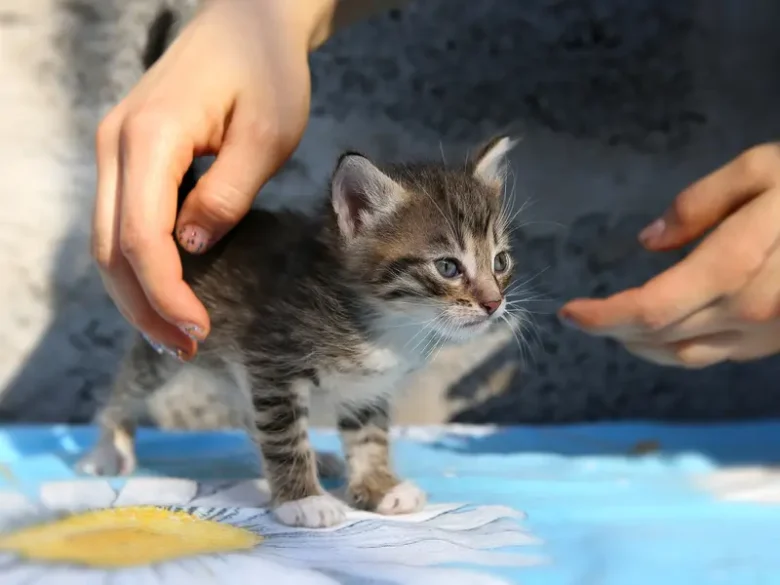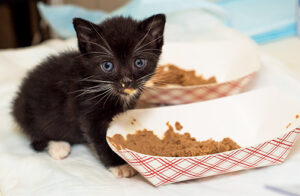There are many myths and false beliefs about kitten care that sometimes lead to improper care. For your cat’s health and safety, it is important to know the truth about these rumours. The purpose of this article is to bust some of the most common myths about kitten care and tell you the truth so your kitten can have the best start in life.
Myth 1: Kittens Can Be Weaned and Rehomed at 6 Weeks Old
Babies can start eating solid food as early as four weeks of age, but they should stay with their mother and littermates until they are at least eight to twelve weeks old. During this time, they can be fully weaned, learn important social skills, and mature physically and behaviorally. Taking kittens from their mothers too early can lead to health and behavioural problems, such as not getting along with other cats and difficulty learning to do the things cats do.
Myth 2: Milk is the Best Food for Kittens
Fact: Many people believe that giving cats milk is good for them, but milk can upset their stomachs, leading to diarrhoea. Ability of kittens to process lactose droplets after weaning. Initially, they should be fed high-quality kitten food or breast milk. As they get older, they should move on to specially prepared kitten food. These foods are created to meet the nutritional needs of cats as they grow.
Myth 3: Kittens Don’t Need Socialisation or Training
Truth: Both dogs and kittens do better when trained and socialised early. By introducing kittens to different people, animals, places and interactions, they can become well-adjusted adult cats who are confident in themselves. Not having enough friends can cause people to behave badly, such as by being anxious, angry or fearful.
Myth 4: Kittens Know How to Use the Litter Box
In fact, cats naturally bury their faeces, but they may not immediately know how to use the litter box. Kittens can learn a lot from watching their mother, but their carers should also show them how to use the litter box. To do this, place them in the box after meals and playtime and gently push them to dig into the nest.
Myth 5: Clip a Kitten’s Claws to Prevent It from Scratching
Basically, declawing is a surgery that removes the last bone from each toe. This can lead to pain, behavioural problems and long-term health problems. Cats naturally love to scratch, so it is important to provide them with a good scratching spot, such as a scratching post or scratching mat. Kittens can learn to use these tools to stop scratching objects without having to clip their claws.
Myth 6: Young Kittens Can’t Get Pregnant
Cats can be sexually mature from the age of 4 to 6 months. By sterilising your pet as soon as possible, you can prevent unwanted pregnancies and reduce the risk of certain health problems. It also helps control pet populations and reduce the number of animals needing homes.
Myth 7: Kittens Need Regular Baths
Cats are usually very clean, so they don’t need to be bathed often. Bathing too much can dry out their coat and cause skin problems. Kittens usually clean themselves well, so they should only be washed when they are really dirty or in a dangerous situation.
Myth 8: Kittens Get Sick If They are Handled Too Much
Truth: Kittens need time to rest and should not be handled too often, but regular, gentle petting can help get them used to others. It helps him get used to touch and can strengthen the bond between the kitten and its carer. It is important to handle kittens gently and know their limits.
Myth 9: Kittens Are Resilient and Don’t Need Veterinary Care Until They Are Older
In fact, kittens should begin vaccinations and health checks as soon as possible, usually between 6 and 8 weeks. It’s important to get them to the vet as soon as possible to detect and prevent health problems and to ensure they get all the vaccines and treatments they need.
Myth 10: Kittens Should Be Kept Indoors Until They Are Fully Grown
Truth: Keeping cats indoors, especially in cities, protects them from problems like disease and traffic, but it’s also important to let kittens outside safely so they can get some exercise and stimulate their senses. This can be done through guided tours or secure outdoor inclosures.
Conclusion:
Breaking these myths about cat care is important for the health of these young animals. Kittens need nutrition, socialisation, grooming and veterinary care so that they can grow into healthy, happy and well-behaved adult cats. By understanding and following proper cat care practices, owners can create a safe and loving space that helps their cats form strong bonds and live fulfilling lives.
FAQs:
1. When should kittens be weaned and find new homes?
Kittens should be weaned and find new homes when they are between 8 and 12 weeks old. These hours give them time to learn the necessary social skills, mature physically and behaviorally, and complete care appropriately.
2. Can cats drink milk?
No, cats should not drink milk, as it can damage their stomachs and cause diarrhea. Kittens should be started on high-quality kitten food or breast milk. As they get older, they should move on to specially prepared kitten food.
3. Do cats need socialisation and training?
Yes, kittens benefit greatly from early training and socialisation. By introducing them to different people, animals and places, they can become well-adjusted and friendly adult cats.
4. Is removing cat claws a good way to prevent cats from scratching furniture?
Declawing is not a good idea because it means cutting off the last bone of each toe, which can lead to pain, behaviour changes and health problems. A gentle way to prevent cats from scratching things they don’t want to scratch is to give them scratching posts and teach them how to use them.
5. How often should you take your cat to the vet for shots and check-ups?
Kittens should receive their first vaccination and health check when they are 6 to 8 weeks old. After that, you should keep an eye on them frequently, as your veterinarian advised, to make sure they grow up healthy and receive all the vaccinations and treatments they require.



